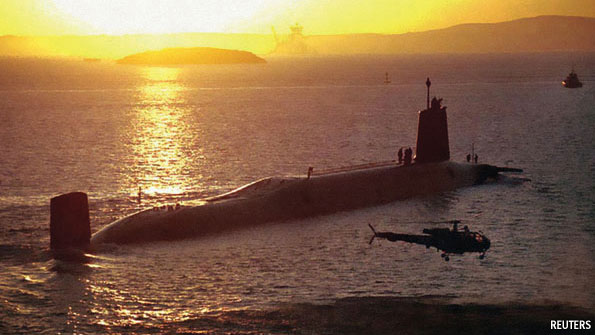
From the Economist: On September 17th the newly formed National Security Council (NSC), chaired by the prime minister, David Cameron, will begin discussing how to cut Britain’s defence budget. The conversation will be informed by the Strategic Defence and Security Review, which the coalition government embarked upon within weeks of taking office. Whereas the last such exercise, completed by the Labour government in 1998, took over a year to conclude, this one must be finished by October 20th, when the coalition will announce the results of its overall review of public spending. …
The most controversial programme of all is the replacement of Britain’s Trident nuclear submarines ([British Defense Minister Liam] Fox has wasted political capital in a fruitless row with the Treasury about who should pay for the renewal). The coalition is committed to keeping the deterrent, albeit with the reluctant support of the Lib Dems. But it may be possible to delay ordering the new boats by several years, and to make do with three submarines rather than the current four. That would put back the costs and save several billion pounds. Alternatives to Trident, such as converting an attack submarine to do the job, seem likely to be dismissed on grounds of cost and effectiveness.
And despite Afghanistan, the army will not escape entirely. A growing emphasis on special forces in ground warfare, combined with rising scepticism about the future utility of heavy armour should allow two or three battalions of infantry to be eliminated, the mothballing of most of the army’s main battle tanks and thus big savings in manpower and logistical support. A smaller army—comprising perhaps 95,000 soldiers rather than the current 107,000—would also make it possible to repatriate most of the roughly 19,000 British troops still stationed in Germany without building new bases or housing.
Less sexy than those headline cuts, but just as important, are the savings to be made in the way the MoD itself operates. Above all, it needs a rational procurement policy. An independent report it commissioned last year described a “conspiracy of optimism” between the services, the defence establishment and industry. Knowing that major programmes are rarely cancelled outright, each of the armed forces has a systematic incentive both to underestimate the likely cost of equipment and to aim for the highest possible specification regardless of risk. The results are routine delays and vast cost overruns.
So there is a pressing need to bring order and sanity to Britain’s overstretched defence budget. But that cannot be achieved overnight. Given the ten-year time horizon that defence planning requires, attempting severe cuts too quickly may be risky militarily and financially, since it might prove costlier to revive needed capabilities in the future than to preserve them now. That will be the message that Dr Fox will take to his colleagues on the NSC. It may well fall on deaf ears. The government’s priority is the deficit, not a sensible defence review. (photo: Reuters)
Image: reuters%209%2010%2010%20Trident%20submarine.jpg
